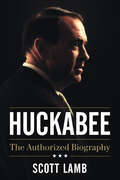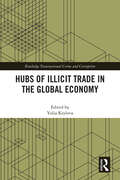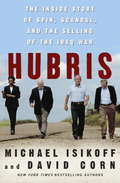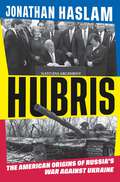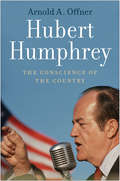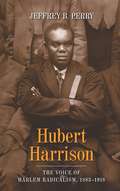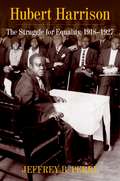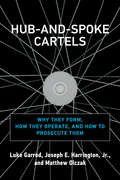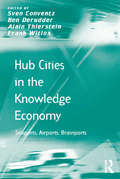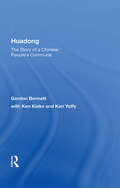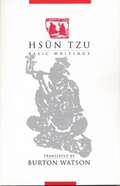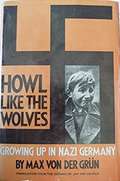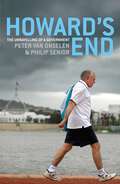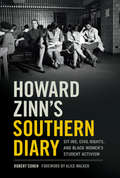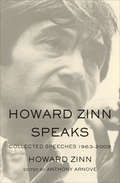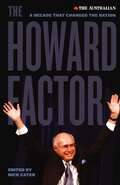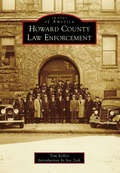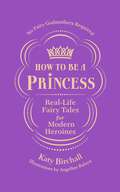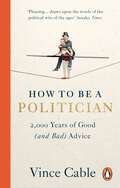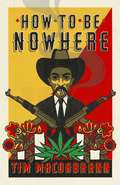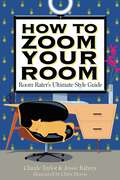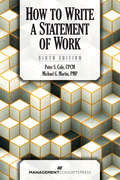- Table View
- List View
Huckabee: The Authorized Biography
by Scott Lamb“How does a man go from . . . pastoring churches . . . to running for President? [This] authorized biography tells this story in all its fascinating detail.” —The PathwayFor the first time, the former governor of Arkansas opens up the vault to friend and biographer Scott Lamb to tell his life story. In this thoroughly unique biography of one of the most likeable, influential leaders in America, Lamb covers the entire scope of Mike Huckabee’s life and career. With full, unfettered access to Governor Huckabee’s personal library, files, and family records, fans will finally get the definitive account of one humble man’s rise to political prominence.The son of a local fireman in Hope, Arkansas, Huckabee began his time in the limelight at the side of James Robison during the early years of his television ministry. He hit his ministerial stride in the early 1980s, when he took the helm of Immanuel Baptist Church in Pine Bluff, Arkansas, from 1980 to 1986.Most people, however, know Mike Huckabee as a politician. In 1994, he became lieutenant governor and faced the now infamous Whitewater scandal that sent then-governor Jim Guy Tucker into court to face felony charges of corruption and fraud. Huckabee’s courageous handling of the debacle endeared him to the hearts of many citizens, causing him to serve as the forty-fourth governor of Arkansas from 1996 until 2007. During his 2008 presidential bid, he finished second to John McCain. As the host of the talk show Huckabee, he garnered even more fans, who will now have the opportunity to get to know the man behind the famous, reassuring smile.
Hubs of Illicit Trade in the Global Economy (Routledge Transnational Crime and Corruption)
by Yulia KrylovaThis book meticulously examines how centers of illicit trade pose myriad threats to global security and sustainable development. The exponential growth of illicit trade, resulting in annual losses amounting to trillions of dollars for the global economy, is increasingly concentrated within specific geographic areas. These locales serve as safe havens for smugglers and their accomplices, fostering a criminal ecosystem that facilitates the convergence of various criminal activities. The book underscores the detrimental impact of poorly regulated international free trade zones, which prioritize expediency over security, thereby allowing illicit trade to flourish in regions characterized by opaque governance and lax regulatory oversight. It comprehensively explores the spectrum of illicit trade present in notorious hubs such as the Argentina-Brazil-Paraguay Tri-Border Area, Dubai, Panama, Belize, Guatemala, and Ukraine. Emphasizing the phenomenon of crime convergence associated with these hubs, the book offers actionable recommendations for disrupting their interconnected illicit supply chains, infrastructures, and networks. By addressing this interconnectedness, the book fills a critical void in understanding how vulnerabilities within the global economy fuel the creation of illicit trade hubs. It will be of great value to researchers in the fields of trade, economics, criminology, and international development. It will also be an excellent resource for government agencies, policymakers, and private-sector managers in those industries most affected by the growing problem of illicit trade.
Hubris: The Inside Story of Spin, Scandal, and the Selling of the Iraq War
by David Corn Michael IsikoffMarch 2003: The United States invades Iraq.October 2006: The world finds out why.What was really behind the U.S.-led invasion of Iraq? As George W. Bush steered the nation to war, who spoke the truth and who tried to hide it? Hubris takes us behind the scenes at the Bush White House, the CIA, the Pentagon, the State Department, and Congress to answer all the vital questions about how the Bush administration came to invade Iraq.Filled with new revelations, Hubris is a gripping narrative of intrigue that connects the dots between George W. Bush's expletive-laden outbursts at Saddam Hussein, the bitter battles between the CIA and the White House, the fights within the intelligence community over Saddam's weapons of mass destruction, the startling influence of an obscure academic on top government officials, the real reason Valerie Plame was outed, and a top reporter's ties to wily Iraqi exiles trying to start a war. Written by veteran reporters Michael Isikoff and David Corn, this is the inside story of how President Bush took the nation to war using faulty and fraudulent intelligence. It is a news-making account of conspiracy, backstabbing, bureaucratic ineptitude, journalistic malfeasance, and, especially, arrogance.From the Hardcover edition.
Hubris: The American Origins of Russia's War against Ukraine
by Jonathan HaslamA leading expert on US-Russian relations reveals how the United States and its European allies set the course for the war in Ukraine—and offers a sobering indictment of American foreign policy since the fall of the Soviet Union.Russia’s full-scale invasion of Ukraine in February 2022 should not have taken the world by surprise. The attack escalated a war that began in 2014 with the Russian annexation of Crimea, but its origins are visible as far back as the aftermath of the Cold War, when newly independent Ukraine moved to the center of tense negotiations between Russia and the West. The United States was a leading player in this drama. In fact, Jonathan Haslam argues, it was decades of US foreign policy missteps and miscalculations, unchecked and often reinforced by European allies, that laid the groundwork for the current war.Isolated, impoverished, and relegated to a second-order power on the world stage, Russia grew increasingly resentful of Western triumphalism in the wake of the Cold War. The United States further provoked Russian ire with a campaign to expand NATO into Eastern Europe—especially Ukraine, the most geopolitically important of the former Soviet republics. Determined to extend its global dominance, the United States repeatedly ignored signs that antagonizing Russia would bring consequences. Meanwhile, convinced that Ukraine was passing into the Western sphere of influence, Putin prepared to shift the European balance of power in Russia’s favor.Timely and incisive, Hubris reveals the assumptions, equivocations, and grievances that have defined the West’s relations with Russia since the twilight of the Soviet Union—and ensured that collision was only a matter of time.
Hubert Humphrey: The Conscience of the Country
by Arnold A. OffnerOne of the great liberal politicians of the twentieth century, rediscovered in an important, definitive biography Hubert Humphrey (1911–1978) was one of the great liberal leaders of postwar American politics, yet because he never made it to the Oval Office he has been largely overlooked by biographers. His career encompassed three well†‘known high points: the civil rights speech at the 1948 Democratic Convention that risked his political future; his shepherding of the 1964 Civil Rights Act through the Senate; and his near†‘victory in the 1968 presidential election, one of the angriest and most divisive in the country’s history. Historian Arnold A. Offner has explored vast troves of archival records to recapture Humphrey’s life, giving us previously unknown details of the vice president’s fractious relationship with Lyndon Johnson, showing how Johnson colluded with Richard Nixon to deny Humphrey the presidency, and describing the most neglected aspect of Humphrey’s career: his major legislative achievements after returning to the Senate in 1970. This definitive biography rediscovers one of America’s great political figures.
Hubert Harrison: The Voice of Harlem Radicalism, 1883-1918
by Jeffrey B PerryHubert Harrison was an immensely skilled writer, orator, educator, critic, and political activist who, more than any other political leader of his era, combined class consciousness and anti-white-supremacist race consciousness into a coherent political radicalism. Harrison's ideas profoundly influenced "New Negro" militants, including A. Philip Randolph and Marcus Garvey, and his synthesis of class and race issues is a key unifying link between the two great trends of the Black Liberation Movement: the labor- and civil-rights-based work of Martin Luther King Jr. and the race and nationalist platform associated with Malcolm X.The foremost Black organizer, agitator, and theoretician of the Socialist Party of New York, Harrison was also the founder of the "New Negro" movement, the editor of Negro World, and the principal radical influence on the Garvey movement. He was a highly praised journalist and critic (reportedly the first regular Black book reviewer), a freethinker and early proponent of birth control, a supporter of Black writers and artists, a leading public intellectual, and a bibliophile who helped transform the 135th Street Public Library into an international center for research in Black culture. His biography offers profound insights on race, class, religion, immigration, war, democracy, and social change in America.
Hubert Harrison: The Struggle for Equality, 1918–1927
by Jeffrey B PerryThe St. Croix–born, Harlem-based Hubert Harrison (1883–1927) was a brilliant writer, orator, educator, critic, and activist who combined class consciousness and anti-white-supremacist race consciousness into a potent political radicalism. Harrison’s ideas profoundly influenced “New Negro” militants, including A. Philip Randolph and Marcus Garvey, and his work is a key link in the two great strands of the Civil Rights/Black Liberation struggle: the labor- and civil-rights movement associated with Randolph and Martin Luther King Jr. and the race and nationalist movement associated with Garvey and Malcolm X.In this second volume of his acclaimed biography, Jeffrey B. Perry traces the final decade of Harrison’s life, from 1918 to 1927. Perry details Harrison’s literary and political activities, foregrounding his efforts against white supremacy and for racial consciousness and unity in struggles for equality and radical social change. The book explores Harrison’s role in the militant New Negro Movement and the International Colored Unity League, as well as his prolific work as a writer, educator, and editor of the New Negro and the Negro World. Perry examines Harrison’s interactions with major figures such as Garvey, Randolph, J. A. Rogers, Arthur Schomburg, and other prominent individuals and organizations as he agitated, educated, and organized for democracy and equality from a race-conscious, radical internationalist perspective. This magisterial biography demonstrates how Harrison’s life and work continue to offer profound insights on race, class, religion, immigration, war, democracy, and social change in America.
Hub-and-Spoke Cartels: Why They Form, How They Operate, and How to Prosecute Them
by Joseph E. Harrington Luke Garrod Matthew OlczakThe first comprehensive economic and legal analysis of hub-and-spoke cartels, with detailed case studies.A cartel forms when competitors conspire to limit competition through coordinated actions. Most cartels are composed exclusively of firms that would otherwise be in competition, but in a hub-and-spoke cartel, those competitors (&“spokes&”) conspire with the assistance of an upstream supplier or a downstream buyer (&“hub&”). This book provides the first comprehensive economic and legal analysis of hub-and-spoke cartels, explaining their formation and how they operate to create and sustain a collusive environment. Sixteen detailed case studies, including cases brought against toy manufacturer Hasbro and the Apple ebook case, illustrate the economic framework and legal strategies discussed. The authors identify three types of hub-and-spoke cartels: when an upstream firm facilitates downstream firms to coordinate on higher prices; when a downstream intermediary facilitates upstream suppliers to coordinate on higher prices; and when a downstream firm facilitates upstream suppliers to exclude a downstream rival. They devote a chapter to each type, discussing the formation, coordination, enforcement, efficacy, and prosecution of these cartels, and consider general lessons that can be drawn from the case studies. Finally, they present strategies for prosecuting hub-and-spoke collusion. The book is written to be accessible to both economists and lawyers, and is intended for both scholars and practitioners.
Hub Cities in the Knowledge Economy: Seaports, Airports, Brainports (Transport And Mobility Ser.)
by Ben Derudder Frank Witlox Sven Conventz Alain ThiersteinThe overarching research topic addressed in this book is the complex and multifaceted interaction between infrastructural accessibility/connectivity of city-regions on the one hand and knowledge generation in these city-regions on the other hand. To this end, the book brings together chapters analysing how infrastructural accessibility is related to changing patterns of business location of knowledge-intensive industries in city-regions. The chapters in this book specifically dwell on recent manifestations of and developments in the accessibility/knowledge-nexus, with a particular metageographical focus on how this materializes in major city-regions. In the different chapters, this shifting relation is broached from different perspectives (seaports, airports, brainports), at different scales (ranging from global-scale analyses to case studies), and by adopting a variety of methodologies (straddling the wide variety of methodological approaches currently adopted in human geography research). Researchers contributing to this edited volume come from different scholarly backgrounds (sociology, human geography, regional planning), which allows for a varied treatise of this research topic.
Huadong: The Story Of A Chinese People's Commune (Westview's Special Studies On China And East Asia)
by Gordon BennettThis concise report on one commune in China's innovative commune system is designed to present key features of the system as a whole. It focuses on the concept of the commune in Chinese Communist Party policy and covers Huadong's government and politics, economy, society, and culture.
Hsün Tzu: Basic Writings (Translations from the Asian Classics)
by Burton WatsonHsün Tzu set forth the most complete well-ordered philosophical system of his day. Although basically Confucian, he differed with Mencius, his famous predecessor in the Confucian school, by asserting that the original nature of man is evil. To counteract this evil, he advocated self-improvement, the pursuit of learning, the avoidance of obsession, and constant attention to ritual in all areas of life. <p><p> With a translation by the noted scholar Burton Watson, includes an introduction to the philosopher in relation to Chinese history and thought. Readers familiar with Hsün Tzu's work will find that Watson's lucid translation breathes new life into this classic. For those not yet acquainted with Hsün Tzu, will reach a new generation who will find his ideas on government, language, and order and safety in society surprisingly close to the concerns of our own age.
Howl Like the Wolves: Growing Up in Nazi Germany
by Max von der GrünThe author intersperses his account of his youth in Nazi Germany with numerous documents and photographs from that period.
Howard's End: The Unravelling Of A Government
by Peter van Onselen Philip SeniorFrom the co-writer of John Winston Howard, the definitive biography of the Prime Minister, comes Howard's End, which takes us behind the scenes of both parties on the announcement of the election campaign and traces the stunning collapse of the Coalition in its last year in government. Peter van Onselen and Philip Senior piece together the events in the year leading up to the 2007 federal election, following the protracted downfall of Australia's second longest-serving Prime Minister and the unraveling of the government as it lurched from crisis to crisis. In the tradition of Pamela Williams' The Victory, Howard's End analyses and makes sense of the result and its far-reaching implications for the people of Australia.
Howard Zinn's Southern Diary: Sit-ins, Civil Rights, and Black Women's Student Activism
by Robert CohenThe activist and author of A People&’s History of the United States records an in-depth and personal account of the Civil Rights Movement in Atlanta. During the Civil Rights Movement of the 1960s, students of Spelman College, a black liberal arts college for women, were drawn into the historic protests occurring across Atlanta. At the time, Howard Zinn was a history professor at Spelman and served as an adviser to the Student Nonviolent Coordinating Committee. Zinn mentored many of Spelman&’s students fighting for civil rights at the time, including Alice Walker and Marian Wright Edelman. Zinn&’s involvement with the Atlanta student movement and his closeness to Spelman&’s leading activists gave him an insider&’s view of the political and intellectual world of Spelman, Atlanta University, and the SNCC. He recorded his many insights and observations of the time in his Spelman College diary. Robert Cohen presents Zinn&’s diary in full along with a thorough historical overview and helpful contextual notes. It is a fascinating historical document of the free speech, academic freedom, and student rights battles that rocked Spelman and led to Zinn&’s dismissal from the college in 1963 for supporting the student movement.
Howard Zinn Speaks: Collected Speeches 1963-2009
by Howard ZinnA wide-ranging collection of speeches—many published here for the first time—by the historian and author of A People&’s History of the United States. Howard Zinn has illuminated our history like no other US historian. This collection of his speeches on protest movements, racism, war, and American history covers more than four decades of his active engagement with the audiences he inspired with his humor, insight, and clarity. This volume features Zinn&’s impassioned and erudite statements on the war in Vietnam, abolishing the death penalty, the legacy of Emma Goldman, the myth of American exceptionalism, the Obama Administration, and much more. &“Reading Howard&’s spoken words, I feel that I am almost hearing his voice again—his stunning pitch-perfect ability to capture the moment and the concerns and needs of the audience, whoever they may be, always enlightening, often stirring, an amalgam of insight, critical history, wit, blended with charm and appeal.&” —Noam Chomsky, leading public intellectual and author of Hopes and Prospects &“With ferocious moral clarity and mischievous humor, Howard turned routine antiwar rallies into profound explorations of state violence and staid academic conferences into revival meetings for social change.&” —Naomi Klein, author of No Is Not Enough and The Battle For Paradise
Howard Factor: A decade that changed a nation
by Nick CaterJohn Howard's federal election victory over Paul Keating in 1996 was the start of a quiet revolution that changed Australia forever. His critics told us he was a white-picket-fence conservative, Little Johnnie, Lazarus with a triple bypass. Instead, Howard has driven a decade of reform, reinventing conservative politics and redefining the national debate. In this long-overdue assessment of the Howard years, some of The Australian's leading commentators chart the seismic shift in politics, society, workplaces, culture, the economy, trade and foreign affairs. They describe how Howard has redrawn the political map, turning the conservatives into reformers and forcing the progressives to defend the status quo. Contributors to the book include Paul Kelly, Steve Lewis, Glenn Milne, George Megalogenis, Christopher Pearson, Matt Price, Dennis Shanahan, Greg Sheridan, Mike Steketee, Alan Wood and cartoonist Bill Leak. Editor Nick Cater is a senior editorial executive at The Australian.
Howard Dean's Prescription for Real Healthcare Reform
by Howard Dean Igor Volsky Faiz ShakirAmericans have pondered how to reform healthcare since the days of Harry Truman. But for most Americans, little has changed-except that healthcare costs have soared, health insurance companies have grown bigger and more oppressive to both doctors and patients, and today even those Americans who pay dearly for health insurance frequently find that their policies don't adequately cover them when they need their coverage most. In his bold new book, Howard Dean-the physician and former governor widely credited for reviving the Democratic Party after the 2004 elections-tells Americans what needs to be done to successfully reform healthcare. One key, he writes, is to offer Americans the option to participate in a public health insurance program, much like Medicare. In this straight-talking guide to overcoming today's healthcare crisis, Dean spells out: * What Obama's healthcare plan is all about * How other countries handle healthcare * Which special interests are standing in the way of progress and why * How healthcare reform will help American businesses prosper * Why Americans need choice-between private and public health insurance coverage Millions of Americans lack health insurance; millions more pay for coverage that doesn't protect them from serious illness; and the status quo leaves Americans at the mercy of corporate interests. This persuasive argument from a passionate political strategist shows Americans how to take back the healthcare reins.
Howard County Law Enforcement (Images of America)
by Tom Kelley Jon ZeckSince the 1880s, when a Howard County sheriff's deputy shot the mayor of Kokomo during the commission of a burglary, Howard County law enforcement officers have played an important role in the community's history. Police officers, deputies, and troopers cleared rowdies out of the junction neighborhood, walked downtown beats, rescued tornado survivors, quelled civil disturbances, cleaned up tragic accidents, and solved grisly murders. By the mid-1940s, a new generation of war veterans came home with a spirit of progress and experience in leadership. The foundation of compassion, perseverance, and integrity they established in Howard County law enforcement has defined their unswerving commitment to the safety of the community and to one another. Images of America: Howard County Law Enforcement tells their story.
How to be a Princess: Real-Life Fairy Tales for Modern Heroines – No Fairy Godmothers Required
by Katy BirchallAs Meghan Markle once said: 'With fame comes opportunity, but it also includes responsibility - to advocate and share, to focus less on the glass slipper and more on pushing through glass ceilings. And, if I'm lucky enough, to inspire.'Inspired by the Royal Wedding on 19 May, this beautiful collection of light-hearted stories celebrates what it takes to be a modern princess. Smart, strong, kind and brave, every princess here - whether they be fictional or real - is awesome.Including: Meghan, Ameera, Elizabeth II, Elsa, Leia, Moana, Tiana, Fiona, Haya, Lalla, Akishino, Maha, Diana, Catherine, Grace, Maxima, Rania AND princesses ahead of their time: Margaret, Elizabeth I, Pingyang, Hatshepsut, Nzinga and Seondeok.This book will make you smile and inspire you to make your own happy ending.
How to be a Politician: 2,000 Years of Good (and Bad) Advice
by Vince Cable'Always forgive your enemies - but never forget their names.' JFK'What do you want to be a sailor for? There are greater storms in politics than you will ever find at sea. Piracy, broadsides, blood on the decks. You will find them all in politics.' David Lloyd George'Unchallenged master of the self-inflicted wound.' Nicholas Soames on Boris Johnson, apropos his switch to campaigning for BrexitStructured to follow the arc of a life in politics - from childhood aspirations and first attempts at getting elected, to navigating the back benches, ascending the greasy pole, dealing with detractors, facing crises, and finally escaping - this unique collection weaves together the wittiest, wisest and most acerbic political quotations from the last 2,000 years. Punctuated throughout by candid insights from Sir Vince Cable, How to Be a Politician is a timeless and entertaining education in the dark arts of politics.
How to be Nowhere
by Tim MacGabhannLife is finally on the right track for reporter and recovering addict Andrew: he is slowly coming to terms with the murder of his photographer boyfriend Carlos, pursuing sobriety and building a new home with a new partner. Andrew has almost forgotten about the story that ruined his life - but that story hasn't forgotten about him, and a series of deadly threats forces him into helping the very man whose gang murdered his boyfriend and left him homeless.A literary take on the classic chase movie, HOW TO BE NOWHERE is the sequel to Tim MacGabhann's genre-busting and critically-acclaimed debut CALL HIM MINE, and a blistering thrill-ride deep into the fog of Central America's murky present and tragic future.
How to be Nowhere
by Tim MacGabhannLife is finally on the right track for reporter and recovering addict Andrew: he is slowly coming to terms with the murder of his photographer boyfriend Carlos, pursuing sobriety and building a new home with a new partner. Andrew has almost forgotten about the story that ruined his life - but that story hasn't forgotten about him, and a series of deadly threats forces him into helping the very man whose gang murdered his boyfriend and left him homeless.A literary take on the classic chase movie, HOW TO BE NOWHERE is the sequel to Tim MacGabhann's genre-busting and critically-acclaimed debut CALL HIM MINE, and a blistering thrill-ride deep into the fog of Central America's murky present and tragic future.
How to Zoom Your Room: Room Rater's Ultimate Style Guide
by Claude Taylor Jessie BahreyThe ultimate users' guide to curating your Zoom background from Room Raters, Twitter's foremost experts in on-screen décor. From the virtual office aficionados and Twitter superstars who brought the world the dreaded embarrassment of &“cord violations,&” comes a fun, informative guide for everyone who now finds themselves having to endure the endless onslaught of digital meetings and calls. Packed with beautiful how-to illustrations that demonstrate visually stunning set-ups and tips from celebrity zoom rooms, Room Rater packs an amusing punch while offering advice on how to up your game and not be embarrassed by your surroundings. Included in the book are examples from TV host Jonathan Capehart, former Obama advisor Valerie Jarrett, Senator Mazie Hirono, historian Michael Beschloss who takes readers on a tour of historic presidential rooms, and many more. Chockfull of practical advice that speaks directly to the home office user, the book offers guidance on how to create good lighting, use the perfect camera angle, get rid of clutter, add aesthetically pleasing touches, and avoid appearing as if you are in a hostage video. Whether we like it or not, the remote workplace is here to stay and this book serves as an essential guide to navigating that new normal. It&’s a valuable tool for everyone who wants to appear professional, competent, and composed.
How to Write a Statement of Work
by Michael G. Martin PMP Peter S. Cole CPCMThe standard on government statements of work just got better!How to Write a Statement of Work has been a standard reference for government employees and contractors for many years. Now, with this sixth edition, it is even more relevant and useful. Based on the excellent foundation laid by the late Peter Cole, Michael Martin has updated and added material to guarantee this handbook's place in the list of "must haves" for working with government contracts. As in the earlier editions, the emphasis is on providing practical, detailed guidance on writing and preparing a description of government requirements, whether a statement of work (SOW), a performance work statement (PWS), or a statement of objectives (SOO).Among the many additions to this sixth edition are updates to reflect the current definition of an SOO as well as references and guidance regarding the development and application of the SOO. There is a new chapter on why change management is so important on projects, legal precedents supporting change management, and how to identify when a change occurs using the SOW. This new chapter also includes information on the federal government's Standard Form 30 (SF30) to provide perspective on how change orders are used and applied in the federal government. If you are working in government contracting in any capacity, you should have this book on hand!
